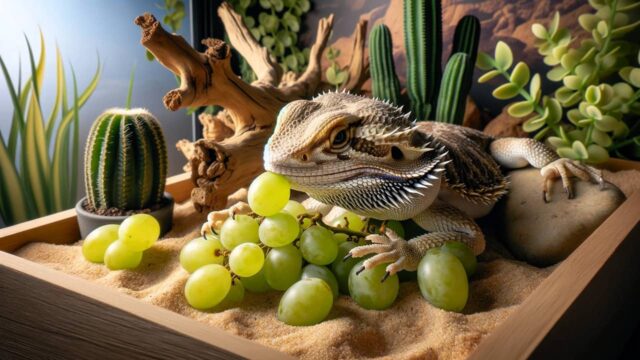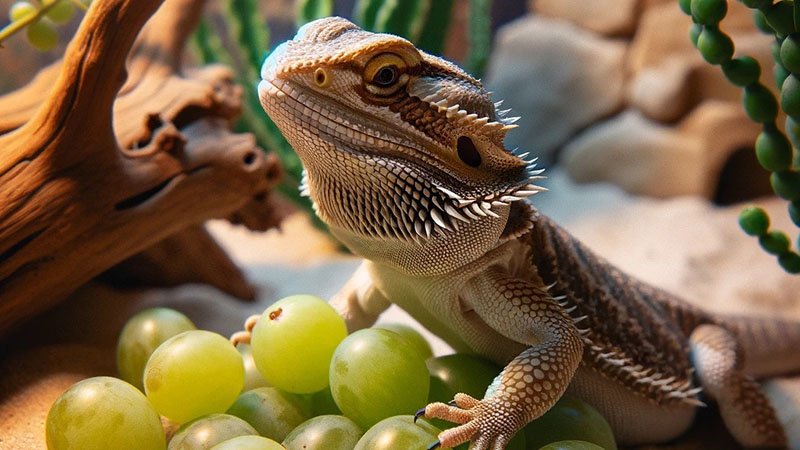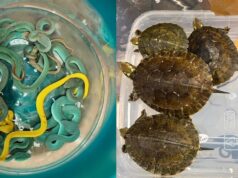
Bearded dragons can eat grapes, but only occasionally and in moderation. Grapes are beneficial due to their high fiber and calcium content, which can support the health of bearded dragons. However, grapes also contain high levels of water, sugar, and oxalates, which can harm your pet’s health if consumed excessively.
When feeding grapes to a bearded dragon, it’s crucial to cut the grapes into quarters to ensure they can be swallowed easily, particularly for baby and young dragons. Always feed grapes sparingly to maintain your bearded dragon’s health and well-being.
How Often Can Bearded Dragons Eat Grapes?
Bearded dragons can safely consume one to two grapes once a week, provided they are in good health and do not suffer from conditions like obesity or diabetes. For Bearded dragons with health issues, limiting grape consumption to once a month is advisable, and it’s important to consult your veterinarian to ensure safety.
Grapes offer several nutritional benefits for bearded dragons:
- High Fiber: Promotes smooth digestion and prevents constipation.
- Low Acidity: Grapes, unlike citrus fruits, do not irritate the mouth or stomach lining.
- Antioxidants: Found in the skin of red grapes, these compounds help reduce inflammation, lower the risk of heart disease, and prevent allergies.
- Water Content (45% to 68%): Helps maintain kidney function and prevents dehydration.
- Potassium: Helps regulate blood pressure.
These nutritional qualities make grapes a suitable treat for healthy bearded dragons when fed in moderation.
Can Bearded Dragons Eat Green, Purple, and Red Grapes?
Bearded dragons can safely consume grapes of any color—green, purple, or red. A healthy bearded dragon can enjoy one or two grapes once a week. However, if your bearded dragon has underlying health issues, it’s important to consult with your vet before offering grapes as a treat. This ensures that the grapes will not adversely affect your pet’s health.
Can Bearded Dragons Eat Grape Leaves?
Yes, bearded dragons can eat grape leaves, which are more nutritious for them than the grapes themselves. Grape leaves are high in protein and calcium, and low in phosphorus, making them an excellent dietary choice for bearded dragons.
Pro Tip: To prepare grape leaves for your bearded dragon, thoroughly wash and chop the leaves, then place them in your beardie’s food bowl. This provides a healthy, beneficial addition to their diet.
Why Can’t Bearded Dragons Have Grapes All the Time?

Bearded dragons should not eat grapes frequently because of their high sugar and water content, which can lead to health issues such as obesity and diarrhea if consumed in excess. Additionally, grapes contain oxalates, which can bind with calcium and potentially lead to nutrient deficiencies, affecting bone health and overall well-being. Therefore, while bearded dragons can enjoy grapes as an occasional treat, they should not be a regular part of their diet.
- High Sugar Content: Grapes contain a significant amount of sugar. Regular consumption can lead to obesity and other metabolic disorders in bearded dragons.
- High Water Content: While hydration is essential, the excessive water in grapes can cause diarrhea or upset the digestive balance in bearded dragons.
- Presence of Oxalates: Grapes have oxalates which can bind with calcium in the dragon’s body. This binding process reduces the amount of calcium available, which is crucial for bone health.
- Nutritional Imbalance: Grapes do not provide a balanced nutrition profile necessary for bearded dragons. Overreliance on grapes can lead to deficiencies in essential nutrients.
- Potential for Toxicity: While not common, the pesticide residue on grapes can be harmful unless thoroughly washed. Organic or home-grown grapes are a safer choice if available.
What’s the Ideal Diet to Feed Your Bearded Dragon?
Bearded dragons are omnivores and require a balanced diet of plant-based foods and animal proteins to stay healthy. Here’s how to feed your bearded dragon to ensure they remains in good health and avoid common health issues like metabolic bone disease and fatty liver disease in bearded dragons:
Diet Composition:
- Babies and Juveniles: Their diet should consist of about 70% insects (protein) and 30% greens.
- Adults: The diet should gradually shift to more greens and vegetables, about 50% insects, and 50% plant-based foods.
Protein Sources:
- Staple Insects: Include gut-loaded crickets and dubia roaches as regular protein sources.
- Occasional Treats: Hornworms, waxworms, and butterworms can be given sparingly due to their high-fat content.
Vegetables and Greens:
- Staple Greens: Collard greens, dandelion greens, turnip greens, and mustard greens.
- Vegetables: Include nutrient-rich options like butternut squash, acorn squash, and bell peppers.
Special Tip: Grape leaves are excellent for bearded dragons. They are high in protein and calcium but low in phosphorus, making them more beneficial than the fruit itself.
It is important to avoid feeding bearded dragons foods that are cute or seem enjoyable but may be harmful. Instead, focus on a diet that promotes their health and longevity.
Fruits to Avoid for Your Bearded Dragon
While fruits can be a healthy part of a bearded dragon’s diet, not all fruits are suitable due to their content of harmful substances like oxalates. Here are some fruits and foods to avoid to keep your bearded dragon healthy:
- High Oxalate Fruits: Avoid fruits high in oxalates, such as grapes (in excess), because they can form calcium stones that hinder nutrient absorption and lead to health issues.
- Citrus Fruits: Do not feed your bearded dragon citrus fruits like lemons, oranges, and grapefruits. These fruits are too acidic and can disrupt their digestive system.
- Avocado: Never feed avocados, as they are toxic to bearded dragons and can cause serious health problems.
- High Oxalate Vegetables: Spinach and broccoli should be avoided as they can bind calcium and prevent its absorption, which is crucial for your pet’s bone health.
- Lettuce: While not toxic, lettuce is generally discouraged as it is low in nutrients and can cause diarrhea in bearded dragons.
It’s essential to choose fruits and vegetables that are safe and nutritious for your bearded dragon to ensure they receive a balanced diet and avoid health complications.
FAQs – Can Bearded Dragons Eat Grapes
Can bearded dragons eat grapes?
Yes, bearded dragons can eat grapes, but they should be given as an occasional treat due to their high sugar and water content, which can cause health issues if consumed frequently.
How often can bearded dragons safely eat grapes?
Bearded dragons can have one or two grapes once a week if they are healthy. It is important to monitor their overall diet and health condition, especially if they have existing health issues.
Are all types of grapes safe for bearded dragons?
Bearded dragons can eat green, purple, and red grapes. However, all grapes should be given in moderation, and it is crucial to ensure they are thoroughly washed to remove any pesticides.
Can bearded dragons eat grape leaves?
Yes, grape leaves are more nutritious for bearded dragons than the grapes. They are high in protein and calcium and low in phosphorus, making them a healthy addition to their diet.
What are the risks of feeding grapes to bearded dragons?
The main risks include potential digestive issues from the high water and sugar content and the possibility of calcium deficiency due to the oxalates in grapes, which can bind calcium. Always feed grapes in moderation as part of a balanced diet.








